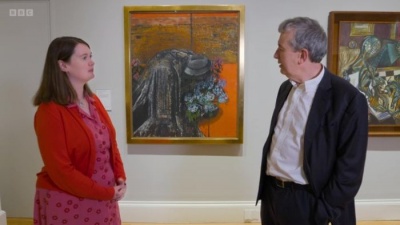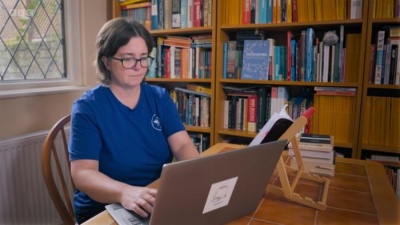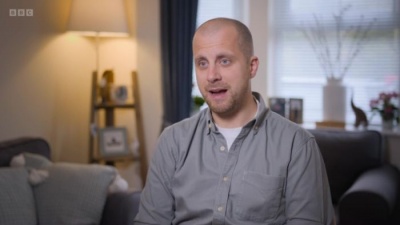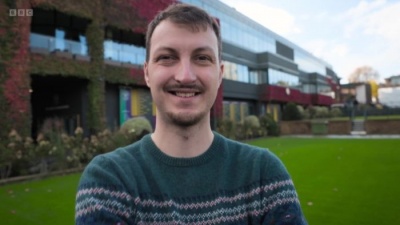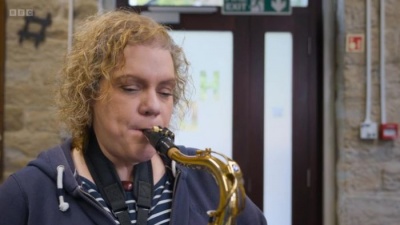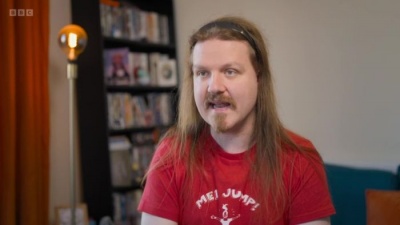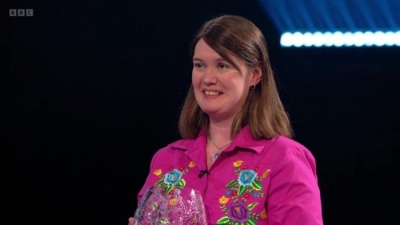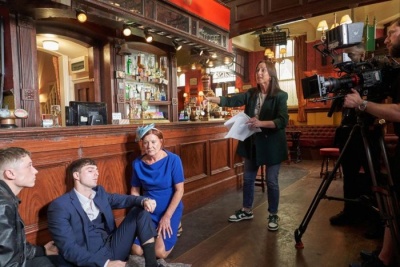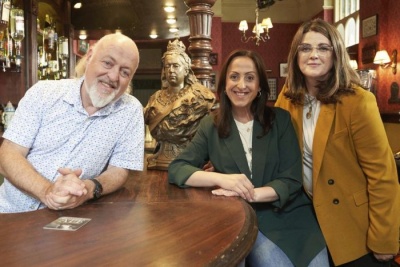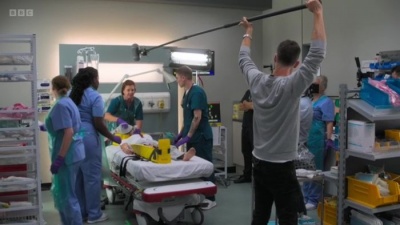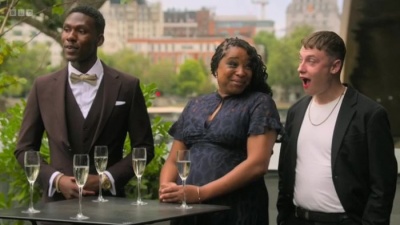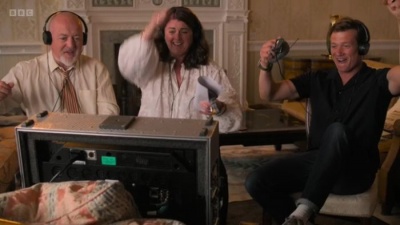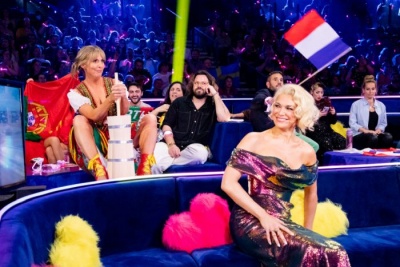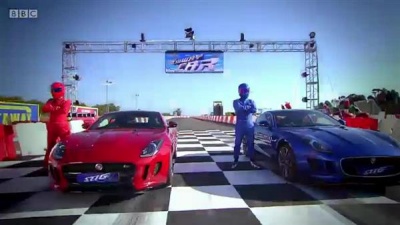Weaver's Week 2024-04-07
(Created page with 'Last week | Weaver's Week Index | Next week <div class=square style="float:right;clear:right;"> [[Fil…')
Newer edit →
Revision as of 10:55, 7 April 2024
Last week | Weaver's Week Index | Next week
"This is your first tv quiz, where do you go from here?" "For a lie down!"
Contents |
Mastermind
The 2024 final
Oli Hanson is our first finalist, he's a software developer from Wolverhampton, now living in London. "Oliver's Army" was the family pub quiz team, "Dad's Army" when the son was away at Brasenose Oxford (and, yes, he was on the UC team five years ago).
His specialist subject for the final is the Wimbledon Singles Championships, 2000-2023. As is traditional, all the finalists get a few minutes to talk about their passion, and visit an appropriate location. Oli gets to talk with Emma from the Wimbledon Museum on the sidelines of Centre Court, and receives a good luck message from famous tennis player Andy Murray. The round gets off to a good start, stumbles a little, and never really recovers. The final score is 8 correct (and 3 passes, which could come into play later).
Ruth Hart is a health policy officer from Scotland, and we find that her mother has been telling everyone, "Have you watched Mastermind? You should be!" There's a touching tribute to Ruth's dad, who introduced Ruth to quizzing in general, and Mastermind in particular. A weird journey to the final, huge score in the first round, only scraped through the semi-final.
Hang on, we need to talk about the last Mastermind semi-final! Won by Ruth Hart, taking the novels of Murial Spark. All four contenders knew their specialist subjects well – Tom Flowerdew on bears, Tom Moody on cricket, and Caryn Ellis on scientist Wiliam Harvey. And all four were roughly equal on general knowledge; final scores of 19 and 20 all round, Ruth won on fewest passes.
In the final, Francis Bacon the artist is Ruth's specialist subject. We learn a very little about the man, the artist, the unique style, from the Scottish Museum of Art. Ruth has worked tremendously well on her specialist subjects through the quiz, and tonight's is no exception. A fast rate of scoring, questions come a bit quicker than usual, and some luck on the buzzer means Ruth scores a PERFECT ROUND – 15 right! That's going to set the cat amongst the pigeons!
Helen Lippell is a taxonomy consultant. Another family link, watching Mastermind with Helen's granny and shouting the answers from the sofa. Husband Simon appeared with Helen (Felinophiles in 2013), and she's been on Mastermind before.
Helen's subject is Sappho, the Greek poet who offers something a bit different from the usual wars and battles. For this research trip, Helen gets an all-expenses paid trip to the Loaded in Paradise offices in sunny King's Cross – well, the big Library there. "Sappho was sung throughout the world, she's more than a voice from 2650 years ago". Helen's round starts strongly, had a few bumps, but Helen is able to ride over the errors and keep on scoring. 10 points!
Sarah Thornton works in Holmfirth as a solicitor. Yes, it's another family of quizzers, with husband Mark and eventually with their daughter. Sarah plays music – the tenor saxophone.
Her subject is the Mercury Music Prize, celebrating the best albums of the past twelve months, and inspiring similar awards like the Polaris Prize, the Choice Music Prize, and the short-livedPrix Constantin. Sarah's lost the Good Trip draw, getting no further than the BBC 6 Records office in rainy Salford, where she talks to Deb Grant. There's also a good luck message from Lauren Laverne. Lots of good answers, lots of good guesses that don't quite land, and a final score of 10 right (and 2 passes).
Thomas Nelson is a teacher from Haydon Bridge, a small village on the Tyne about 30 miles from Newcastle. We meet wife Eleanor and a quick look at the children in his primary school class. Another unorthodox path to the final, Thomas only qualified as the highest-scoring runner-up when another contender couldn't compete in the semis.
The Marquis de Lafayette is the best character in Hamilton. The original was a French nobleman who fought on behalf of the rebellious colonies. We're off to meet a curator at George Washington's Mount Vernon, only this trip is being done by internet link. Good luck comes from his school class. A mistake early in the round doesn't disturb his focus, and the round finishes on 12 points.
George Twigg, a clinical trials co-ordinator from East Leeds, is aided by his regular partner. He's been on University Challenge in 2011, and Only Connect in 2019. This blog doesn't, as a rule, comment on contenders' style, but George points out that he has long hair and very loud shirts. He was encouraged by neighbour Jack Grasham, a contender on Mastermind from 2009.
Clara Schumann is his specialist subject, and we hear from Isata Kanneh-Mason, the concert pianist of the family – and, like Clara, a composer. The round starts strongly, has its bumpy bit in the middle, and that seems to knock just a little of the pace off the round – George is having to think about his answers, not just snap them out reflexively. 10 points!
General knowledge
Oli is first back into the chair, and knows he's got to get seven right just to get on terms with the leader. He has so many passes that he'll lose a tie-break, so he might as well pass as many as needed to cram in an extra question. Passes and errors don't put him off his stride, and a final score of 21 (with 7 passes in total) is a great recovery. On another day – in another series – he will do well.
Helen's up next, picking her way through a difficult general knowledge round (doing primitive Pythagorean triples in your head? Nasty!) Final score is 25 points (and no passes), which will be put the others right into the corridor of uncertainty.
Sarah returns to pick out the location of Vanuatu, the celebrity cook with a double-barrelled surname (no, the other one), and the bona fide of the phrase. Zucchini give another point, as does professional quiz answer Margaret Thatcher, but the price of a first class stamp a) evades her and b) is extortionate. The final score is 24 points (and 3 passes).
George knows about The Night Watch painting, and the records of Olivia Rodrigo, but the producers hear "Richard Osmand" for "Richard Osman"; the producers' decision is final, even when it is probably wrong. George is snapping out the answers, most of them right. Most, but not all – the round rather falls apart in the final seconds, and ends on 22 points (and 1 pass).
Thomas remembers who the current Formula One champion is, the constellation known as "great dog", and various varieties of port. The answers don't flow freely for the first minute, but when he gets a run together, Thomas puts his foot down and really makes a move. Falls away again towards the end, and the total is 26 points (no passes). His run over the series is a remarkable 26-26-26.
Ruth knows what she needs to do: a good general knowledge round is all that's required. Couple of the marks are knocked off in the opening moments, but then there's an error, and we can see Ruth ruminating on the missed question rather than concentrate on the incoming poser. Finally, after an agonising passage, Ruth scores again, and this time sparks a run of successes. Tick, tick, tick, Charles Lindburgh brings up the tie, Macbeth takes her over the line, and the amniotic fluid puts the icing on the cake. 28 points (no passes).
So Ruth Hart, a health policy officer from Scotland, is this year's Mastermind champion. Congratulations to her, a superlative specialist round deserved the highest reward. After her lie down, Ruth expects to keep on quizzing.
Bring the Drama
Wall to Wall for BBC2, 13 February – 20 March
Apparently, the BBC is running a campaign to get people interested in acting and the theatre. We say "apparently", because we'd managed to miss any other part of the project, and we can think of many interesting ways to peek behind the curtain. (How do they do the lighting on Gladiators? What does a television make-up person do? Who writes the script for Westminster Live? How do radio mikes work?)
But you can't do drama without actors, and this show concentrated on the cast. Eight real-life actors are introduced to us; across six episodes, we get to know them quite well. Delasi, a young Black man with fiery passion. Older actors George and Janice, who come to acting later in life. Jordan, a seriously talented non-binary talent from Manchester. Lizzie, who got somewhat squashed in the edit. Rehanna, who is partially sighted. Chris, who is deaf. Luca, priced out of drama school by the fees.
The group is mentored and coached and assessed by Kelly Valentine Hendry, a casting director who has worked on hit shows like Broadchurch and Bridgerton. Bill Bailey, the comedian and actor, is the host who asks clarifying questions the viewer might want to know. They're joined by a star from each of the genres they work in.
And by "genre" we really mean "show". Across the series, our talents worked on East Enders, a soap opera set in London. They were in forensic medical drama Silent Witness, and in hospital soap Casualty. The spicy world of Peaky Blinders gave a fight scene, and there was tenderness at Downton Abbey. Note how all of these are serious programmes: comedy requires very different skills, and it would be unfair to ask new actors to hop from tragedy to comedy and back again.
Each episode fell into a formula. We meet the guest star, and learn a little about their programme. There's a "table read", where everyone goes through scripts to try and work out the various character types. Then there are "auditions", our performers deliver an individual piece to try and convince Kelly and the guest star to cast them in a good part. Throughout the process, Kelly will offer "notes", instant feedback on what she's looking for, how the actor can improve their performance.
Once the casts are set, everyone gets to go to the set of East Enders or Casualty or wherever, and they shoot their pieces – in real time, against a real clock. When the first group have finished, we move on to the second group, both are directed by the guest star. The performances are edited together overnight, and shown in the final minutes. Kelly declares her Cast of the Week, and the standout individual performance wins Actor of the Week.
As the series progresses, the plots get more complicated, the lines get longer. There are a few format tweaks – Downton Abbey was a couple discussing their relationship, ending in a warm and fuzzy moment, and all of the actors got a lead part in one of four pairs. Throughout, we see a supportive atmosphere, the actors look after each other, celebrate their achievements. Kelly's criticism is sharp and concise, and always factual, and always constructive: she doesn't want to bring the other person down, she wants people to improve.
The best performers across these five episodes are identified, and come back for the "industry showcase" – a short piece to camera, something the talent wrote themselves. It's recorded without editing, and played to casting directors and bigwigs from various television and film companies. Can our three winners land a job on a show you might have heard of?
Fundamentally, Bring the Drama wanted to open up acting to a new audience. The genre requires a lot of training, there's never a huge amount of money to be had, and these days it seems that you need to be rich – or have wealthy parents – to succeed as an actor. All of the contestants on the show had some sort of roadblock, some circumstance that prevented them from being an actor.
Although the show could only take eight talents on board – and could only find jobs for three of them – it served a purpose by opening up a conversation. Why is acting so badly funded? Why are the arts subject to the whim of quangos, or the demeaning largesse of charity? Bring the Drama has no answers, but it can bear witness and ask the questions.
We must also assess Bring the Drama as a piece of television in its own right. The format is a little derivative, series where amateurs do a professional's job are as common as The Great Massive Pottery Interior Bake Chef Factor. And in particular, as familiar as last year's Mamma Mia casting show, just swapping the lush Greek villa for the real Casualty front desk.
Unlike the musical theatre shows, Bring the Drama is serious, there aren't many jokes, and nobody is here to have a good time. Hard work is expected, hard work is provided. The resulting show is a solid and satisfying programme; we're pulling for all of the actors to do well, to have their moments of brilliance. Perhaps the show suffered from not having many really high points: hard work doesn't make compelling telly.
Viewer reaction was muted, basically because there weren't many viewers. 9pm on Wednesday night only brings about 750,000 to BBC2, and Bring the Drama was exactly that popular. We're glad that it opened enough doors to cast the showcase talent (Delasi on East Enders, Jordan on school drama Waterloo Road, Rehanna on something for one of the streamers), and to give the others enough oomph to progress their talent. The show didn't change the face of television, but may have opened a few eyes.
In other news
"Two decades from now, when you're all running the country". Ooh, shade from the University Challenge host as Trinity Cambridge left the competition with their heads held high. (More than can be said for old boy Kwarteng, who will quit as an MP later this year; if he ever is, he'll be remembered for completely flustering the economy a few years ago.)
Ahem. Trinity lost to Imperial London by 240-110. The bonuses simply didn't fall for Trinity, picking up just 5/24 all night – on their previous form, eight starters would convert to about 150 points. But Trinity only got eight starters – that shows how they were outbuzzed, Justin Lee picked eight starters on his own, including the Children's Crusade from about two of its many leaders.
UCL made it an all-capital affair, beating Manchester by 210-165. Ali Izzatdust continued his fearless buzzing with half a dozen starters, including a spectacularly fast spot of Guwahati in Assam. Manchester got their share of starters, more than Trinity had last week, but Manchester again struggled with the bonuses – well, apart from the set about places in Beatles songs, which Dan Grady nailed in no time at all. Manchester made a great contest of it, often within striking distance, but UCL were always able to pull that little bit ahead. Final's next week.
Results of the RTS Programme Awards have come out, voted by members of the Royal Television Society. Squid Game Colon The Challenge won in Entertainment, ahead of The Wheel and Strictly. Hannah Waddington took Entertainment Performance for her Eurovision host; Eurovision itself won Live Event. An Outstanding Achievement Award went to Stephen Lambert, head of the Studio Lambert division of All3Media. Not quite winning: Taskmaster lost in Comedy Entertainment, The Piano didn't win Formatted Popular Factual, and Junior Bake Off fell in Daytime to Scam Interceptors.
The fastest quiz in the world, says ZDF about their forthcoming Skydive Quiz. First-time parachutists try to answer simple questions while falling from 5 kilometres due up (that's 15,000 feet, or 7.2 Richard Osmans). They say it's the fastest quiz in the world, but then say the contestants only have three seconds to answer the question.
Can we fact-check this claim? We can fact-check this claim, using maths familiar to Isaac Newton. Assume that gravity acts at 9.8 m/s/s, and you're asked the question just before jumping out of the plane. Because you're falling from rest, your initial fall is slower than one might expect – in the first three seconds you'll reach a speed of 29.37 m/s – that's just over 100kph, about 60mph.
Now, does anyone remember The Getaway Car, a one-series blunder BBC1 tried a few years back? One of the rounds involved contestants shrieking out answers while being driven round a racetrack by The Red Stig and The Blue Stig. We very much expect that some of these rounds will have reached 100mph, 160kph, or a free-fall of about 4.5 seconds. (By comparison, a top-speed F1 car can go at 300kph, which represents a freefall of about 8 seconds.)
So no, we suspect Skydive Quiz is not the fastest quiz in the world. From the description, we fear that it might be as one-note as The Getaway Car.
I can do anything! De alleskunner is coming to ITV. The Dutch show features 100 contestants, who are given some things to do. The sole task is to not be the last one to finish the task, because then you'll be off the show. Repeat, repeat, repeat until two players remain. Players who are set to finish quite low in a challenge tend to get most of the edit, so we're gently encouraged to get to know the underdogs and perhaps cheer for them (we'll have more on this in a couple of weeks).
According to reports, ITV have commissioned eight episodes, which strikes us as a bit short – the show needs ten to twelve episodes, give us time to see each challenge before it's over. The Dutch original has a style of "looks cheap", which suggests they've paid great attention to detail. The tone will be key – ITV's version doesn't need to repeat the original, but the show will need to have an editorial voice and use it from the first moment. 99 to Beat is a rubbish title, sounds like people going in the boxing ring with an ice cream.
Where could this sit in the schedule? If it is eight one-hour shows, we might consider Tuesday at 9, or the Saturday evening slot where The 1% Club currently does well. We can imagine this being shown in the early autumn weeks before I'm a Celebrity starts – or the winter nights to follow The Masked Singer. Anyway, there are whole series available to watch worldwide.
Where are you, Annie? The BBC's mysterious travel show Destination X will be made by Two Four (part of ITV Studios). It's another co-production between the Beeb and NBC, like The Traitors. To summarise, Destination X is a coach trip with all the windows blacked out, with hints (and distractions) to help people work out where they are. When asked to guess their location, whoever's furthest from the correct answer is off the show and out of the game. The format has been a decent hit in Belgium, somewhat less successful in France and Germany.
Step on the truths Bridge of Lies has been sold Stateside. The quiz asks contestants to get from the start to the finish, stepping only on the facts. Game Show Network will air the programme, renamed Beat the Bridge, with Cameron Mathison hosting.
Radio's best promotions are summarised by Sean Ross, including "Vorbotten word", Hallowe'en stunts, and a challenge to stay awake while listening to Virgin 1215. Not all promotions are competitions, and not all competitions make compelling listening. The best are real-world drama, whether the stakes are a million quid or two beloved hosts on a coach trip.
What is key art? The little pictures on I-player and All4, trying to sell the show in one eye-catching image. Fred Hammarlund talks about the new talent on this week's Show and Telly podcast. Justin and David also talk about quizcoms.
Coming up this week, Race Across the World (BBC1, Wed) and Glow Up (BBC3, Wed) both return for new series. The best student minds emerge in the University Challenge final (BBC2, Mon), and the best houses in Home of the Year (RTÉ1, Tue). Another chance to see the 1974 Eurovision Song Contest (BBC4, Sun), hosted by Lady Katie Boyle.
Next Saturday has the very last Saturday Night Takeaway (VM1 and ITV, Sat). We'll reflect on the show's legacy next week.
Picture credits: Hindsight / Hat Trick, Wall to Wall, EBU/BBC, BBC Entertainment, Weaver.
To have Weaver's Week emailed to you on publication day, receive our exclusive TV roundup of the game shows in the week ahead, and chat to other ukgameshows.com readers, sign up to our Google Group.


